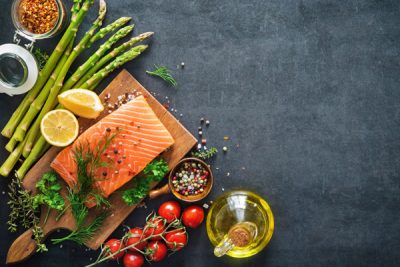I could have titled this article,
“6 Easy Steps to Detox Your Body in the New Year” or “Diet Resolutions for the New Year”
But I didn’t.
Every January, folks are looking for inspiration. After a few weeks of heavy eating and partying, it’s not unusual to feel that your body needs a break.
This does not mean detox. This does not mean crash dieting. There’s no one thing you can abolish from your diet that’s going to provide a fountain of youth. This simply means getting back on track with balanced eating. And no, despite “keto” being the rage, I’m not recommending it to the general population.
So many popular fad diets and diet recommendations over the past few years have focused on eliminating certain ingredients, or complete food groups, in an effort to achieve a healthy diet. Sugar has been the focus of many health professionals who are looking for easy ways to solve the obesity crisis (and writing catchy “sugar is toxic” books, and doing infomercials to sell them). Too much sugar isn’t a good thing, and you should be aware of how many sweets are in your diet. You can cut back on candy, sweet baked goods, and sugary drinks. This doesn’t mean scouring every food label for a tiny source of sugar, nor do you have to restrict all types of carbohydrates.
If only it were that simple.
Any nutrition counselor that has seen thousands of patients or clients can tell you: No two people have the same eating habits or schedules, nor do they eat the same types of foods, nor do they have the same medical or weight history, nor do they have the same family background. Which means, fad diets don’t work for the long haul.
Also important – if you have a disease of any kind (high blood pressure, diabetes, kidney disease, heart disease, bowel or digestive diseases), fad dieting can really be a problem (DASH Diet, along with the Mediterranean and Flexitarian diets, were rated Best Diets for 2020). Request a consultation with a registered dietitian to review the specific diet therapy related to your medical history.
Why single out carbs?
It would be nice to think that one simple ingredient could be the cause of our nation’s unhealthy waistlines, but so many other factors have impacted health and body weight over the past century. In spite of the Keto craze (yes, eating a diet high in fat, moderate in protein, and very low in carbohydrate will promote weight loss. However, I’m not convinced it’s healthy or sustainable for most people).
Think about all of the changes in the environment. Both adults and children have certainly become more sedentary. Desk jobs and technology have replaced a lot of jobs that required physical labor. Children are using their phones and tablets, instead of running outside to play after school. There are also many more types of junk foods on the market, as well as over-sized portions. There are many more restaurants to choose from and more people eat out.
It’s not just the sugar. A low carb or keto diet may work for some people, but if you are feeling guilty for enjoying carbs, or you felt horrible when you tried to cut back, pay attention to your own body.
“Instead of focusing on what you shouldn’t eat, focus on what you should eat.”
You may get into an eating rut, dwelling on the negative – especially this time of year when there are so many diet commercials and news spots that focus on extreme dieting. Negativity can impact your mindset in regard to any aspect of your life. Step back. Resolve to focus on your whole diet and your total nutrition. Rather than waste money of “detox plans”, reboot your body naturally:
- Skip alcohol. If you enjoy a cocktail, you likely had a few too many over the past few weeks. You don’t have to do “dry January” (unless you choose to) but you’ll feel better if you skip it for a couple of weeks. Make yourself a nice cup of tea with honey. Enjoy a sparkling water with lemon or cucumber in a pretty stemmed glass.
- Add antioxidants. Brightly colored fruits and veggies are loaded with important vitamins and are a healthy addition to your diet. Antioxidants help protect your body’s cells. Look for leafy greens like spinach, Swiss chard, or kale to cook up or add to salads. You can even make a fruit-and-veggie smoothie for a refreshing way to add important antioxidants to your diet.
- Add lean protein at breakfast and lunch. Studies have shown, that for middle-aged folks, protein becomes even more essential to maintain a healthy diet. Balance carbohydrate foods (cereal, toast) with protein. Research has shown that protein is best utilized when it’s spread out through the day, instead of being consumed at one evening meal. An ideal amount is about 20-30 grams at each meal. Milk, eggs, cottage cheese, ricotta cheese, or Greek yogurt can boost your breakfast protein, and adding the dairy can help lower blood pressure and support weight loss. Choose a lean meat and vegetable at lunch as opposed to filling up on carbohydrates. Add protein to salads such as tuna, salmon, cottage cheese, beans, or chicken. Beans are a good source of protein too, and an excellent source of antioxidants – include them on salads, or in soups and chili.
- Skip sweets and dessert. I’m sure you had your fill of cookies last month. Take a few weeks to focus on balanced meals, and skip dessert.
- Focus on fruit at snack time to satisfy your sweet tooth. It’s likely that your fruit intake isn’t where it should be for optimal health. You can enjoy fresh fruit in between meals to ensure that you get the servings that you need each day. If you’re in a banana rut, change things up a bit. Look for sale items in the produce section and treat yourself to some fresh strawberries, oranges, clementines, kiwifruit or pineapple. Frozen fruit is also economical and can help with food waste.
- Add a variety of whole grains. Try to plan and cook at least three meals at home each week, gradually increasing that goal. Grains like quinoa, brown rice, wild rice or barley are economical, easy to prepare and can be eaten as healthy leftovers for lunch the next day. Try new recipes, like these quinoa crusted chicken fingers, and enjoy new flavors!
- Set small goals for exercise. Oprah Winfrey recently admitted she still hates to exercise, but she does it because she knows it’s good for her body and mind. Set small goals to get 10-15 minute of exercise in 6 days a week. Make time for it. Everyone has 15 minutes. As you get into that routine, you can add minutes, and before you know it you’ll be moving more each day.
New Year, Better You
Embrace who you are. You don’t have to turn into a “new you” but improving upon oneself supports living a life with purpose. Making healthy changes in your meal choices will help you be the best you that you can be. Proper diet and exercise won’t make all of your problems disappear, but it can improve your overall wellbeing.
Don’t bother with fads or overly restrictive diet plans. Instead, find the tools you need, or consult with registered dietitian to get a personalized plan, and start the new year off happy.
DASH Diet Recipes to Start off the New Year:






